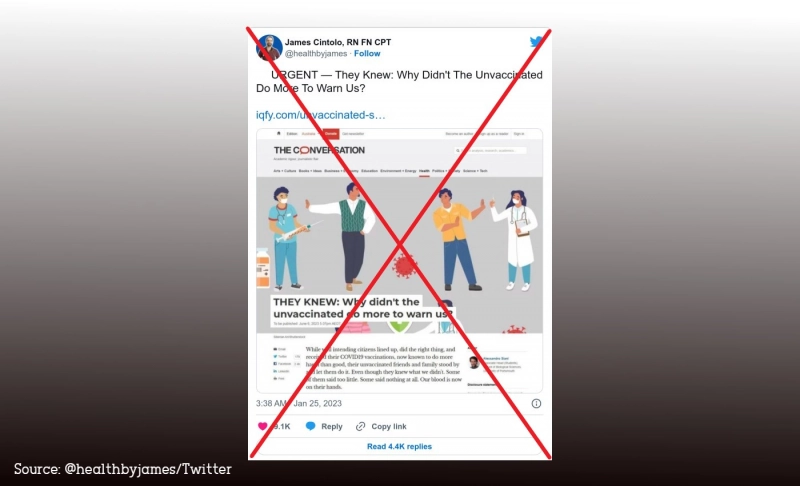By: Vivek J
February 3 2023

A digitally altered screenshot with the logo of The Conversation was used to propagate misinformation on COVID-19 vaccines.
Context
A purported screenshot of an article published by The Conversation went viral on social media. This screenshot had a heading that read, “They knew: Why didn't the unvaccinated do more to warn us?" The headline implies that those unvaccinated against COVID-19 knew the risks associated with vaccines and that they did very little to warn those who actually went out and got the jabs. Such posts, which were shared across multiple platforms like Facebook, Instagram, Twitter, and TikTok, are incorrect. The screenshot is fake.
In Fact
Upon closely looking at the viral screenshot, it appears that the date of publication on the article is June 6, 2023. As of publication, it is February 2023, and June is still several months away. The screenshot has clearly been altered.
The Conversation is a network of media outlets that publish research and news articles online. There are no articles published on the Conversation's website with such a headline as seen in the viral post. The link shared with the screenshot in the viral post goes to a different website altogether.
The Conversation responded via its official Twitter handle by tagging one such viral post with the screenshot and said that it was a fake image. They also shared the link to the original article. The headline reads, “COVID: unvaccinated people may be seen as ‘free riders' and face discrimination." The published date for this article is January 6, 2023.
The author of the original article in The Conversation is Dr Alessandro Siani, whose picture and credentials can be found within the piece. The same information was also found on the digitally altered screenshot in the viral posts. Dr. Siani responded with a Linkedin post and said, “the screenshot is photoshopped.” He reiterated that he had not written an article with the title shown in the viral screenshot. Dr. Siani also shared links to his original works on ResearchGate and Google Scholar.
Ever since the beginning of the COVID-19 pandemic, anti-vaxxers and conspiracy theorists have been using various means to propagate misinformation about the pandemic and the subsequent vaccination drive alike. Logically and other independent factcheckers have debunked hundreds of such narratives.
The Verdict
A digitally altered screenshot of an article written by Dr. Alessandro Siani published on The Conversation's website has been used to spread misinformation about COVID vaccines. Conspiracy theorists and anti-vaxxers are sharing this digitally altered screenshot to propagate narratives with malicious intent. Therefore, we have marked this claim as false.
The COVID-19 pandemic has given rise to a lot of potentially dangerous misinformation. For reliable advice on COVID-19, including symptoms, prevention, and available treatment, please refer to the World Health Organization or your national healthcare authority.